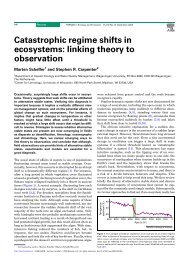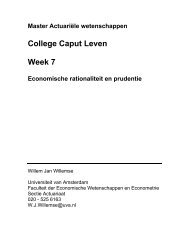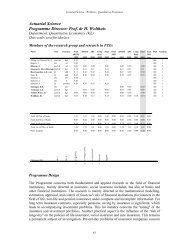How Do Corporate Venture Capitalists Create Value for ...
How Do Corporate Venture Capitalists Create Value for ...
How Do Corporate Venture Capitalists Create Value for ...
Create successful ePaper yourself
Turn your PDF publications into a flip-book with our unique Google optimized e-Paper software.
1. Introduction<br />
<strong>How</strong> <strong>Do</strong> <strong>Corporate</strong> <strong>Venture</strong> <strong>Capitalists</strong><br />
<strong>Create</strong> <strong>Value</strong> <strong>for</strong> Entrepreneurial Firms?<br />
US corporations started to establish internal venture capital funds (often referred to as corporate<br />
venture capital) back in the 1960s. Over the years, corporate venture capital investments accounted <strong>for</strong><br />
around 7% of venture capital industry reaching 10% in recent years. In the year 2000, corporations<br />
invested in almost 1900 entrepreneurial companies with a total dollar investment of around $16 billion.<br />
<strong>Corporate</strong> venture capitalists (CVCs) present an interesting case study, since, even though they share a<br />
number of features with independent venture capital firms (IVCs), they are significantly different from<br />
IVCs in many ways, some of which are as follows. First, CVCs are structured as subsidiaries of<br />
corporations and can only have one (corporate) investor as opposed to IVCs, who are traditionally<br />
structured as limited partnerships where general partners invest in entrepreneurial firms on behalf of<br />
limited partners who provide the funds <strong>for</strong> investment. Second, the per<strong>for</strong>mance-based compensation<br />
structure enjoyed by IVC managers is normally not found in CVC funds, where managers are mostly<br />
compensated by fixed salary and corporate bonuses, so that corporate venture capitalists may be less<br />
concerned than IVCs with the immediate financial returns from their entrepreneurial firms. Third, the<br />
presence of a corporate parent may provide CVCs with a unique knowledge of the industry and the<br />
technology utilized by the entrepreneurial firm. 1<br />
The venture capital literature has argued that venture capitalists, in general, create value <strong>for</strong> the<br />
entrepreneurial firms they invest in several ways. For example, Hellman and Puri (2000, 2002)) has<br />
documented that IVCs are able to create product market value <strong>for</strong> entrepreneurial firms, by<br />
“professionalizing” firm management and helping them develop contracts with suppliers and customers. 2<br />
At the same time, a number of papers in the venture capital and IPO literature have argued that the pricing<br />
1<br />
See Gompers and Lerner (2000) <strong>for</strong> a detailed discussion of the differences in governance and compensation structures between<br />
CVCs and IVCs.<br />
2<br />
The assumption that venture capitalists can help entrepreneurial firms per<strong>for</strong>m better in the product market has also become<br />
standard in the theoretical literature on venture capital: see, e.g., Repullo and Suarez (2001) or Chemmanur and Chen (2003)).<br />
1
















